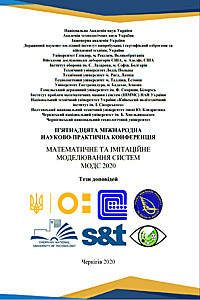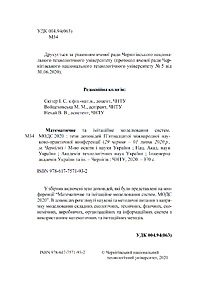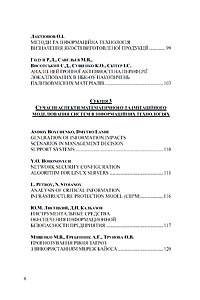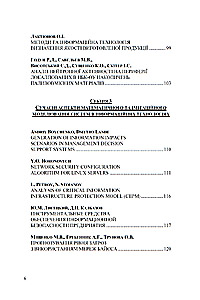|
Andriy Boychenko, Dmytro Lande
Generation of information impacts scenarios in management decision support system // Математичне та ╕м╕тац╕йне моделювання систем. МОДС 2020 : тези допов╕дей П'ятнадцято╖ м╕жнародно╖ науково-практично╖ конференц╕╖ (29 червня . 01 липня 2020 р., м. Черн╕г╕в) / М-во осв╕ти ╕ науки Укра╖ни ; Нац. Акад. наук Укра╖ни ; Академ╕я технолог╕чних наук Укра╖ни ; ╤нженерна академ╕я Укра╖ни та ╕н. - Черн╕г╕в : ЧНТУ, 2020. - P. 110-111.
The growth and complexity of the information space requires scientists to immediately solve the problem of increasing the effectiveness of the information impact in the information-analytical component of modern computer networks. As a result, analysts have to work with information resources that are unprecedented in their volumes, versatility, dynamism and growth rates. This forces specialists to improve methods and technologies for loading, structuring and analyzing various data. Development of scenarios for the evolution of a situation is an important component of information security and computer systems and networks management. These scenarios provide an opportunity to investigate how significant is the impact of each influencing factor on the functioning and security of computer systems. The features of developing scenario models using cognitive maps and methods for developing of information impacts scenarios based on the analysis of the content of global computer networks are considered. This approach provides a solution to the problem of generating and ranking scenarios for impacting objects that correspond to the selected key concept analyzing the input text arrays working on a full-time basis.. Improved information models and computer domain analysis tools have been developed. This makes it possible for an expert analyst to investigate these processes and generate results in a form convenient for decision-making. A method is proposed for constructing a domain model in the form of a semantic graph formed according to the monitoring of computer networks by determining the most significant concepts and the relationships between them. A method is proposed for the formation of optimal scenarios of informational impacts on target objects of a subject area based on finding many routes of influence distribution. Software and algorithmic tools for transferring data to the OWL format are developed. The construction of cognitive maps allows you to reflect the main factors and possible reciprocal flanking between them, and is the basis for building more detailed computer scripts to develop the situation. Thus, the use of cognitive maps in the implementation of the scenario approach can significantly increase the effectiveness of analytical activities. The approach considered allows us to structure the problem, identify the most significant concepts (factors), take into account the connections between the concepts and the nature (strength) of these connections, and also choose the best combination of methods and thereby increase the validity of decisions [5]. The research results, in particular, information models, data analysis and visualization algorithms, are used in scenario generation tools in several security and defense decision-making support systems. |




